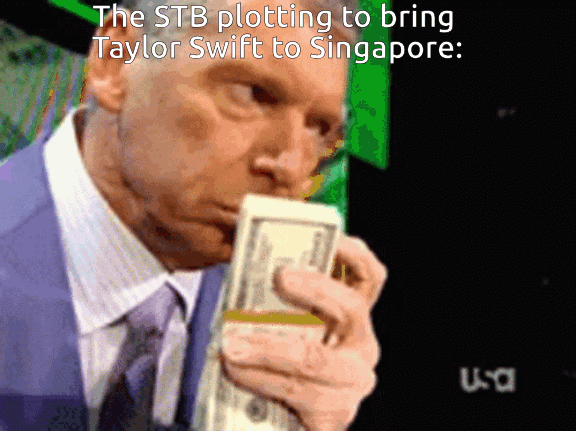Asia Tea Time - Cup 45 ☕
This week I talk Japan’s stock market hitting new highs, yields for your spare cash and Taylor Swift’s Eras Tour in Singapore.
Macro in Asia
Japan’s Nikkei stock market index hits record high

Japan’s iconic Nikkei 225 Index, a collection of Japan’s largest stocks, hit a record high earlier in the week.
It’s a record level that the index last saw in 1989 and has now surpassed as it surges past the 39,000 level.
Why it’s happening
- Japan is the new darling of developed Asian markets as it attracts money out of China.
- A weak Japanese Yen, ultra-low interest rates, and improving company earnings are all giving investors optimism that Japan’s economy can start seeing meaningful growth.
Why it matters
- Developed markets, like the US and Japan, are seeing strong rallies in their stock markets while China’s stocks remain in the doldrums – highlighting the contrasting fortunes between the world’s first- and third-largest economies, and its second-largest.
- Japan’s key stock market index had never regained its prior highs for over 30 years since the real estate and stock market bubble burst in 1989.
What’s next?
- Can the extraordinary rally in Japanese stocks keep going? Watch out for corporate reforms and how its companies can position themselves in new, emerging technologies, such as AI.
Tim’s Take
Japan had been a market that many international investors dared not touch after three decades of underperformance. That’s now changing.
What Japan also has going for it is strong corporate earnings as wages start to rise and inflation returns to the economy.
Yet supporting the outlook in the short term are low interest rates (which are actually negative) as both foreign and domestic investors look to Japan’s stock market.
Famous investors like Warren Buffett have been active in Japan in recent months as investor sentiment gains momentum.
What’s not that much discussed is Japan’s position in the technology supply chain and the ongoing “chip wars”. Many of its unsung heroes, from the company perspective, are high-tech chip toolmakers.
They’re benefitting from a surge in demand from the likes of Nvidia, TSMC and a host of other companies involved in the semiconductor supply chain.
The new buzz surrounding AI is certainly helping Japan’s semiconductor-related sectors, with record earnings from Nvidia this week helping to fuel the rally in Japan.
The new buzz surrounding AI is certainly helping Japan’s semiconductor-related sectors, with record earnings from Nvidia this week helping to fuel the rally in Japan.
Overall, the picture looks bright for Japanese companies but, as with any investment, investors can still expect short-term volatility.
Tim's Money Tip of the Week

Interest rates are still high and, while that has been used as an argument for why stocks struggle, it also means savers can earn something on their spare cash.
That hadn’t been the case for almost 13 years prior to 2022, when the US Federal Reserve started raising interest rates.
So, with interest rates in the US now at 5.25-5.5%, where can investors find a decent yield? Well, first off, we know that we should have 6-12 months’ worth of expenses in cash as an emergency fund.
Putting that emergency fund into a very safe and liquid yield-earning account means that at least we’re able to earn a return on our cash.
The caveat is that in Singapore, our interest rates are typically at least 1% lower than ones you can find for US dollar deposits.
While the big banks offer decent yields, you have to jump through so many hoops on credit card spending, salary crediting and investment/insurance purchases to get the headline rate.
For an easy return, many have turned to money market funds (MMFs). These are very liquid, low-to-no risk funds that invest in fixed deposits across many banks.
In Singapore, the largest is the Fullerton SGD cash fund, which is currently yielding around 3.9%.
With a 0.15% management fee, you as an investor can probably receive a 3.75-3.8% yield after fees – that’s not bad.
Of course, you do need to be aware that these deposits are not insured by the Singapore Deposit Insurance Corp (SDIC), that insures bank deposits up to a certain amount.
However, for most of us, the safety of Singapore dollar fixed deposits spread across multiple financial institutions (as the Fullerton cash fund does) shouldn’t concern us too much.
Story of the Week

The Singapore Tourism Board (STB) and culture ministry confirmed that they had awarded an economic grant to pop megastar Taylor Swift to ensure she played her six shows exclusively in Singapore.
Thailand’s Prime Minister – Sretta Thavisin – had previously told a business forum that Singapore had paid Swift nearly US$2.8 million per show, apparently on the condition that Singapore would be her only stop in Southeast Asia.
With Swift playing six shows in early March in Singapore – all completely sold out – that’s a tidy sum for the cultural and music icon.
Taylor Swift’s Eras Tour is a worldwide phenomenon and it’s no surprise that Singapore was first in line in Southeast Asia.
